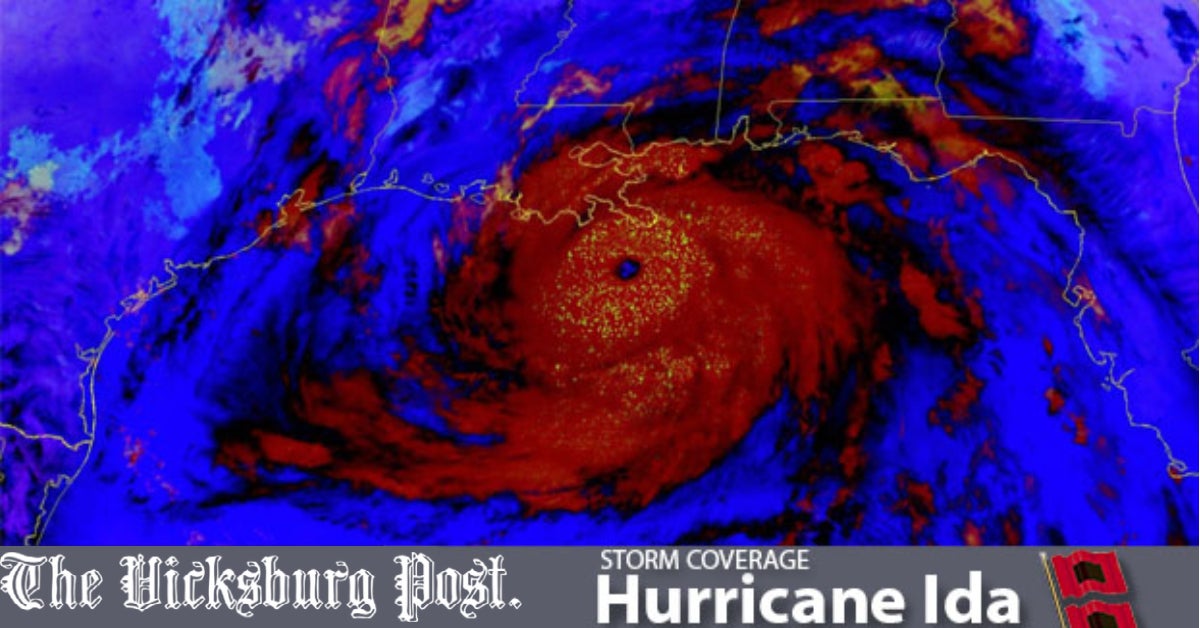Mississippi emergency officials advise public on post-Hurricane Ida response
Published 6:28 pm Sunday, August 29, 2021
Multiple state agencies have begun mobilizing resources to respond to problems in Mississippi counties affected by Hurricane Ida, according to information from the Mississippi Emergency Management Agency.
Ida made landfall about noon Sunday in an area near Port Fourchon, La., with 150 mph winds.
According to the 4 p.m. National Weather Service advisory, Ida had maximum sustained winds of 130 mph. The storm’s eye is expected to pass east of Warren County about 1 p.m. Monday, according the National Hurricane Center’s present projections.
According to a press release from MEMA, state emergency officials are working directly with state counties already impacted by the storm.
Once the storm passes, officials said, residents can report damage to their homes through MEMA’s self-reporting website at https://www.msema.org/contact/crisistrack/. Residents should also document the damage and file an insurance claim.
Residents in the areas affected by the storm should stay off the roads, officials said, but if emergency travel is necessary, drivers should be cautious around debris and be aware of roadside workers.
If they encounter standing water on a road, they should turn around and find an alternate route.
Officials with the Mississippi State Department of Health say people in storm-affected areas should take the following precautions involving food safety:
If power is out for less than two hours, food in the refrigerator and freezer will be safe to eat. Keep refrigerator and freezer doors closed as much as possible to keep food cold longer.
After two hours, a freezer that is half-full will hold food safely for up to 24 hours. A full freezer will hold food safely for 48 hours.
After two hours, pack milk, other dairy products, meat, fish, eggs, gravy and spoilable leftovers into a cooler surrounded by ice. Inexpensive Styrofoam coolers are fine for this purpose.
Safe water for drinking, cooking and personal hygiene includes bottled, boiled or treated water.
Do not use contaminated water to wash dishes, brush your teeth, wash and prepare food, wash your hands, make ice or make baby formula. If possible, use baby formula that does not need to have water added.
Boiling water, when practical, is the preferred way to kill harmful bacteria and parasites. Bringing water to a rolling boil for 1 minute will kill most organisms.
People need to take the following precautions to prevent potentially fatal carbon monoxide poisoning:
* Do not burn charcoal or gas grills inside a house, garage, vehicle, tent or fireplace.
* Do not use gas-powered generators or pressure washers in enclosed spaces including indoors or in the garage.
* If you suspect you are experiencing any symptoms of CO poisoning, such as dizziness, headache or shortness of breath, open doors and windows, turn off gas appliances and go outside.
*In cases of severe CO poisoning, call 911 emergency services or the Mississippi Poison Control Center at 1-800-222-1222.
When cleaning up storm-damaged areas, wear protective clothing and sturdy shoes to prevent cuts and scratches from debris. Do not let children play in floodwater and discard any items that come into contact with floodwater.
Any food (including food in plastic or glass), medicines, cosmetics or bottled water that has come in contact with floodwater should be discarded. If in doubt, throw it out.
Intact cans may be thoroughly disinfected with one-quarter cup of bleach to one gallon of water, and then used.
When cleaning debris around the home, be sure ladders are secure before climbing on them to clean the roof and gutters. If you plan to use a chainsaw to clear debris, be sure to operate the machine according to the instructions. If injury occurs, call 911 or seek immediate medical help.
Flooding can cause mold to grow inside a home, which can cause allergic reactions, asthma episodes, infections and other respiratory problems. MSDH does not handle mold removal or abatement. People should call a private contractor for further assistance.
A tetanus vaccination is recommended if it’s been 10 years or more since the last tetanus vaccination. In the event of a puncture wound or wound contaminated with floodwater, individuals should consult a healthcare provider.
Homeowners impacted by flooding who do not receive their water supply from a public water system regulated by the MSDH should have their private well inspected, disinfected and sampled in order to protect their health.
For step-by-step instructions on disinfecting your private water well, visit the MSDH website at HealthyMS.com/wells.







